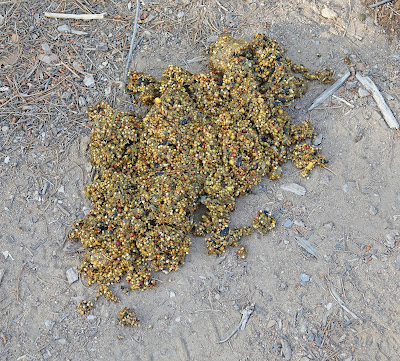When we arrived at the oasis at daylight this is what the feeder looked like.
We reviewed the one hundred plus video clips taken after we left yesterday. To save battery we leave a one minute time between short clips, so it doesn't flow well, but watching enough of them gives a complete picture of what's going on. For starters, the bear is getting better at getting seed from the feeder, based on his scat. The older scat has very little seed in it but the recent stuff is solid seeds.
After we left yesterday, he went to the feeder and spent hours spinning out seed, which he frequently paused to eat. Below are a few of the clips. To see more, go to this link:
https://photos.google.com/share/AF1QipMlgxADe3gD9EOlnQ4eL93lnuB6D90bIrbqcDAwa7nv-d4fVR6qrMUFhmRdCTyNYA?key=YzhDckRWelV3NDJIVjR2X1RmUTNOYUZoYTdUUUNn
We had put down a mat full of nails (unwelcome mat) that he carefully avoided stepping on. However, he was still able to access the seed by leaning across the mat. The dates and temperatures on the videos are not correct for some reason. Should be April 29, and I'm sure the temperature was not nearly that hot.
Texas Parks & Wildlife came out and helped us install a solar electric unit. It's not as powerful as an electric jolt from the grid, but still supposedly does the trick. We shall see. The rubber mat the TP&W helper is standing on is to keep birds from getting shocked. The current will only work if you stand on the wire and touch the feeder at the same time. Humans would have to do it barefoot to get a mild shock.
As I write this the bear is back behind the feeder, where he spent last night. He's waiting for photographer Troy Williams to leave. (Photos by Troy)

.JPG)

.JPG)
.JPG)
.JPG)



.JPG)


.JPG)




.JPG)
.JPG)
.JPG)
.JPG)
.JPG)

.JPG)
.JPG)
.JPG)
.JPG)
.jpg)
.JPG)








.JPG)
.JPG)
.JPG)
.JPG)
.JPG)
.JPG)
.JPG)
.JPG)
.JPG)

.JPG)
.JPG)
.JPG)
.JPG)
.JPG)

